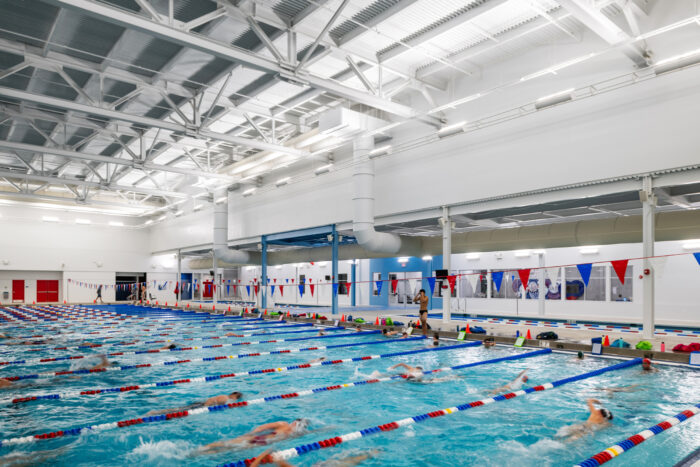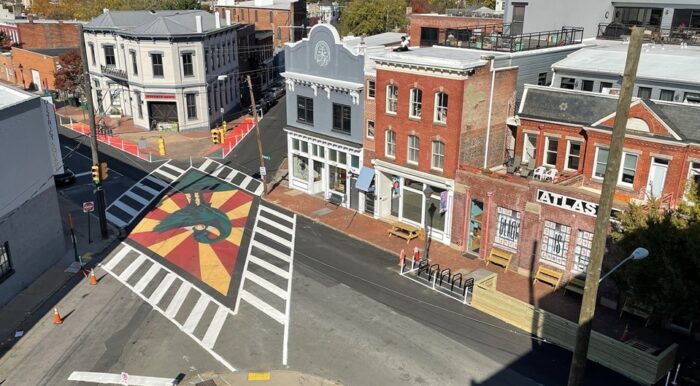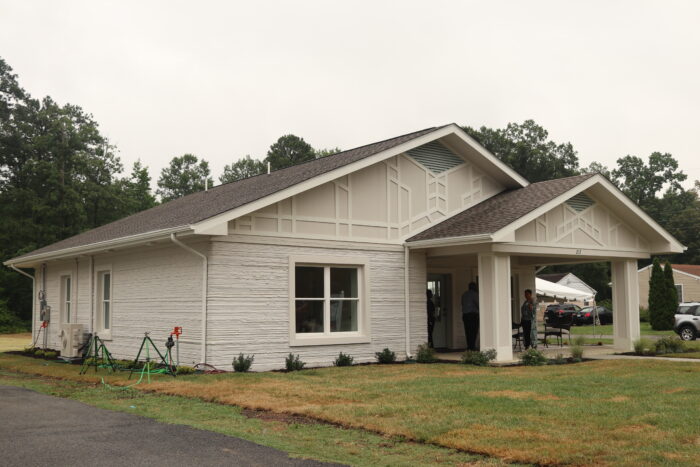
NOVA of Virginia Aquatics’ conversion of Regency’s former
Macy’s South building was among the adaptive reuse honorees. (Images courtesy Historic Richmond)
A former department store’s conversion to an indoor swimming facility and the first house in Richmond built with 3D-printed materials were among the top honorees at this year’s Golden Hammer awards.
The annual awards recognizing standout real estate projects in the region were presented Thursday night by nonprofits Historic Richmond and Storefront for Community Design. A total of 12 awards were presented from among 34 nominees in a ceremony held at Hardywood Richmond.
Top winners included NOVA of Virginia Aquatics’ conversion of the former Macy’s South building at Regency into an indoor swimming facility, as part of the Henrico mall’s ongoing mixed-use transformation. The $18 million project was one of three recognized in the Best Adaptive Reuse category.
In addition to NOVA, project team members included Regency owners Rebkee Co. and Thalhimer Realty Partners, and the Henrico County Economic Development Authority. Baskervill was the architect, Hourigan was the contractor, Dunbar was the structural engineer and Paddock Construction Co. was the pool consultant.
Best New Construction in the “small” category went to Richmond’s first 3-D printed home at 217 Carnation St. Project team members included Project:Homes, Better Housing Coalition, Virginia Housing, Virginia Tech Center for Housing Research, Alquist 3-D, Cromwell (architect), McClure Engineering Co., RMT Construction and Mi Jalisco Landscaping.
Best New Construction in the “medium” category went to The 2200 at Cary, a $5 million townhome development at 2200 W. Cary St. Project team members included owner-developer CaryShields Mews LLC, architect Johannas Design Group, engineer Systematic Engineering, contractor Daniel & Company and landscape architect Cite Design.
In the “large” division, Best New Construction went to The Current, the $68 million mixed-use development at 21 E. Fourth St. in Manchester. Project team members included developer Lynx Ventures, property owner 400 Hull Street LLC, designer Hickok Cole Architects, contractor: KBS and landscape architect Kimley-Horn.
Also recognized in the Best Adaptive Reuse category were local nonprofit Oakwood Arts for its renovation of an old church, daycare building and cottage/rectory at 3511 P St., and RVA Kids First Collective for its conversion of a 15,000-square-foot warehouse at 100 Everett St. in Manchester.
Oakwood Arts’ team included Johannas Design Group, Lewis Ginter Botanical Gardens, HG Design Studio, Virginia Community Capital, Groundwork RVA, and contractors Atlantic Construction, Karnage Construction, Hileman Construction and Thabiti Construction.
RVA Kids First’s team included property owner Thomas Kirk Tattersall; Fultz & Singh Architects; engineers Gradient, Permit Zip and Balzer & Associates; contractor Hourigan; landscape architect Wendell Welder; and tax credit consultant Sadler & Whitehead.
Best Placemaking and Urban Design went to the Brook and Marshall streets placemaking project in Jackson Ward, the Huguenot Flatwater Accessible Ramp at 8600 Southampton Road, and the Playground+ at 1500 Harwood St.

The placemaking project at Brook and Marshall streets in Jackson Ward was among this year’s Golden Hammer winners.
Best Historic Restoration went to a 19th-century Petersburg home rehab at Poplar Lawn at 41 D’Arcy St. Best Community Institution Revitalization went to two projects: the Sarah Dooley Center for Autism at 8000 Brook Road, and YWCA Richmond’s renovation of its headquarters at 6 N. Fifth St.
More on the award winners and nominees can be found here.
The awards’ judges were Kim Chen with the City of Richmond, Historic Richmond Executive Director Cyane Crump, Better Housing Coalition CEO Greta Harris, Community Foundation for a greater Richmond’s Natisha Knight, Storefront’s Allison Leighton, Modern Richmond co-founder Andrea Levine, Baskervill Chairman Burt Pinnock, Richmond Memorial Health Foundation’s Michael Smith, and VCUarts’ Camden Whitehead.

NOVA of Virginia Aquatics’ conversion of Regency’s former
Macy’s South building was among the adaptive reuse honorees. (Images courtesy Historic Richmond)
A former department store’s conversion to an indoor swimming facility and the first house in Richmond built with 3D-printed materials were among the top honorees at this year’s Golden Hammer awards.
The annual awards recognizing standout real estate projects in the region were presented Thursday night by nonprofits Historic Richmond and Storefront for Community Design. A total of 12 awards were presented from among 34 nominees in a ceremony held at Hardywood Richmond.
Top winners included NOVA of Virginia Aquatics’ conversion of the former Macy’s South building at Regency into an indoor swimming facility, as part of the Henrico mall’s ongoing mixed-use transformation. The $18 million project was one of three recognized in the Best Adaptive Reuse category.
In addition to NOVA, project team members included Regency owners Rebkee Co. and Thalhimer Realty Partners, and the Henrico County Economic Development Authority. Baskervill was the architect, Hourigan was the contractor, Dunbar was the structural engineer and Paddock Construction Co. was the pool consultant.
Best New Construction in the “small” category went to Richmond’s first 3-D printed home at 217 Carnation St. Project team members included Project:Homes, Better Housing Coalition, Virginia Housing, Virginia Tech Center for Housing Research, Alquist 3-D, Cromwell (architect), McClure Engineering Co., RMT Construction and Mi Jalisco Landscaping.
Best New Construction in the “medium” category went to The 2200 at Cary, a $5 million townhome development at 2200 W. Cary St. Project team members included owner-developer CaryShields Mews LLC, architect Johannas Design Group, engineer Systematic Engineering, contractor Daniel & Company and landscape architect Cite Design.
In the “large” division, Best New Construction went to The Current, the $68 million mixed-use development at 21 E. Fourth St. in Manchester. Project team members included developer Lynx Ventures, property owner 400 Hull Street LLC, designer Hickok Cole Architects, contractor: KBS and landscape architect Kimley-Horn.
Also recognized in the Best Adaptive Reuse category were local nonprofit Oakwood Arts for its renovation of an old church, daycare building and cottage/rectory at 3511 P St., and RVA Kids First Collective for its conversion of a 15,000-square-foot warehouse at 100 Everett St. in Manchester.
Oakwood Arts’ team included Johannas Design Group, Lewis Ginter Botanical Gardens, HG Design Studio, Virginia Community Capital, Groundwork RVA, and contractors Atlantic Construction, Karnage Construction, Hileman Construction and Thabiti Construction.
RVA Kids First’s team included property owner Thomas Kirk Tattersall; Fultz & Singh Architects; engineers Gradient, Permit Zip and Balzer & Associates; contractor Hourigan; landscape architect Wendell Welder; and tax credit consultant Sadler & Whitehead.
Best Placemaking and Urban Design went to the Brook and Marshall streets placemaking project in Jackson Ward, the Huguenot Flatwater Accessible Ramp at 8600 Southampton Road, and the Playground+ at 1500 Harwood St.

The placemaking project at Brook and Marshall streets in Jackson Ward was among this year’s Golden Hammer winners.
Best Historic Restoration went to a 19th-century Petersburg home rehab at Poplar Lawn at 41 D’Arcy St. Best Community Institution Revitalization went to two projects: the Sarah Dooley Center for Autism at 8000 Brook Road, and YWCA Richmond’s renovation of its headquarters at 6 N. Fifth St.
More on the award winners and nominees can be found here.
The awards’ judges were Kim Chen with the City of Richmond, Historic Richmond Executive Director Cyane Crump, Better Housing Coalition CEO Greta Harris, Community Foundation for a greater Richmond’s Natisha Knight, Storefront’s Allison Leighton, Modern Richmond co-founder Andrea Levine, Baskervill Chairman Burt Pinnock, Richmond Memorial Health Foundation’s Michael Smith, and VCUarts’ Camden Whitehead.




Great stuff!